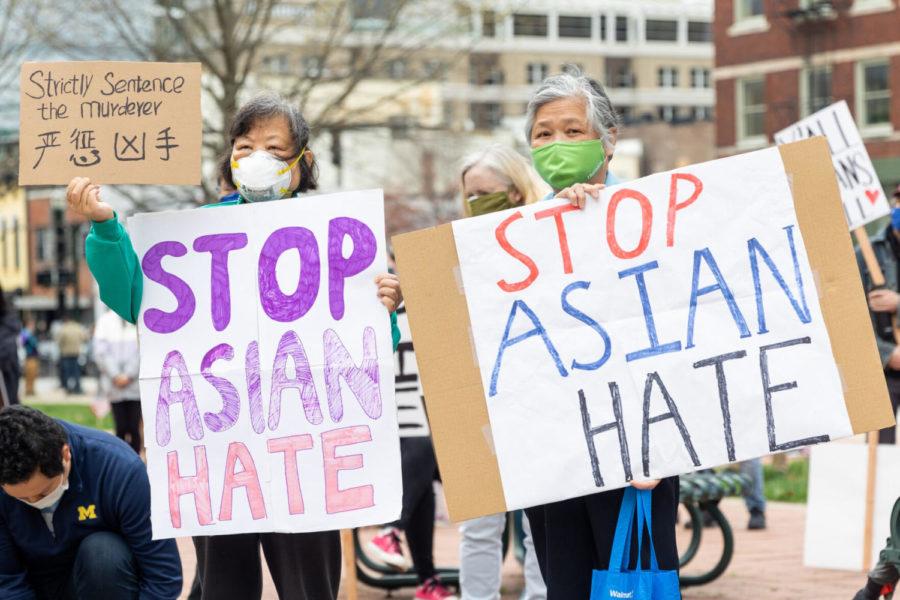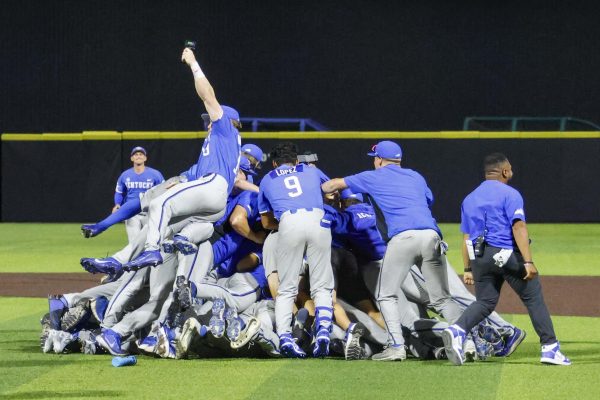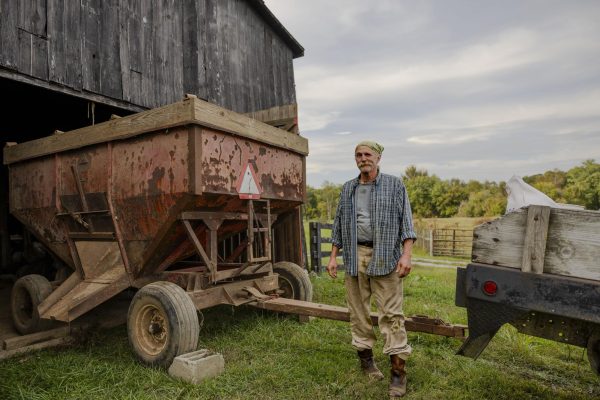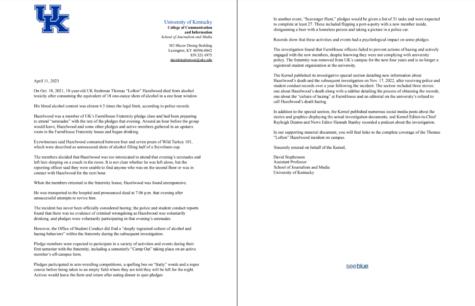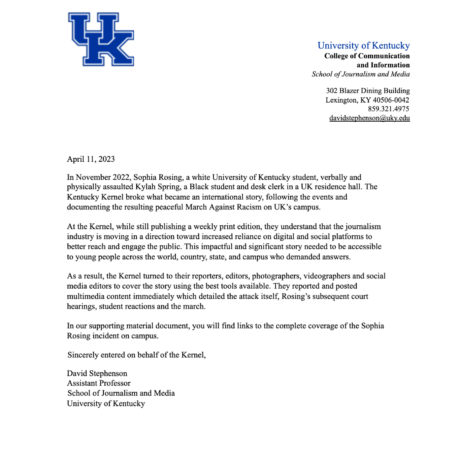Rallies condemn violence against Asian Americans, proclaim ‘we belong here’
April 1, 2021
A gray sky and bitter wind set the tone for a day of mourning and remembrance on Saturday in Lexington, as hundreds of people gathered for rallies condemning rising violence against Asian Americans.
Dozens of cities across the country held similar rallies in memory of the victims of the March 16 shooting in Atlanta, where eight people – six of them women of Asian heritage – were killed by a lone gunman, Robert Long.
Two rallies were held in Lexington, one at 11 a.m. and one at 2 p.m., both outside of Robert Stephens Courthouse. The first rally featured multiple speakers.
Many rally participants said the Atlanta shooting was a shock and wake-up call. 15-year-old Sofia Wu, who helped organize an afternoon rally, said she reacted strongly to the Atlanta shooting.
“It was just l a very unexpected visceral, emotional reaction to something like that happening,” Wu said. “We had kind of been standing in allyship earlier this summer with the Black community and facing all the police brutality, but I never really fully got it until now.”
Though Long has now been charged with murder, the initial police response to the shooting sparked outlash when investigators brushed off the violence by saying Long had had “a bad day,” a statement condemned by speakers at the first rally on Saturday. Long purchased the gun used the same day of the shooting, bringing renewed attention to American gun laws. But the Atlanta shooting also shone a spotlight on the intersection of racism and misogyny and the effects that conflux has on treatment of sex workers.
Dr. Huajing Maske, executive director of the Office of China Initiatives, spoke at the morning rally. She said the Atlanta shooting was a reminder of the long history of oppression of Asian Americans.
“No longer we can remain voiceless, invisible and even raceless. We must address the issue of the perpetual foreigner,” Maske said.
Like other speakers, Maske exposed the myth of Asian Americans as the “model minority”, saying she refused to stay silent and stoic any longer.
“Yes, it is true that most of our Asian Americans are self-reliant. We are resilient and we don’t want to make waves,” Maske said. “However, let me tell you this not speaking up does not mean we do not suffer, nor does it mean that we do not experience prejudice.”
Maske said the answer to racism is solidarity, a fact demonstrated by the multinational coalition that organized the morning rally, which began at 11 a.m. and was attended by nearly 200 people.
Chinese, Nepali, Filipino, Taiwanese, Korean and Japanese groups all coordinated the morning rally, a day of remembrance, in partnership with faith groups.
“The allyship is pretty amazing,” said attendee Vivian Liu said. “I came here thinking maybe three four different speakers from different groups, but we really had a lot of support around the community that’s really awesome.”
Speakers said that their friends and family in other countries are worried about their safety in the U.S. Approximately 15,000 people of Asian American and Pacific Islander heritage live in Lexington.
Dr. Keiko Tanaka, a first-generation immigrant and professor of sociology at UK, is one of them.
Tanaka spoke at the morning rally and said the Atlanta shooting was a wake-up call for her
She regretted not speaking up sooner and had enough of the model minority myth being used as an excuse to treat Asian Americans as invisible.
“The problem is white hate and white terrorism,” Tanaka said. She cautioned against coalitions against racism from turning to the kind of hatred that fuels white supremacy.
Many speakers in the morning and afternoon rally, which began at 2 p.m. and had around 100 attendees, also decried the model minority stereotype.
“Asians are not the model minority myth,” Sofia Wu said. “We are not going to kind of sit by and watch this happen and continue to be subservient to an oppressive society.”
Ailis Wiggett, a friend of Sofia Wu’s, said it was important for white people to take these issues seriously.
“It’s really important for white people to listen and educate themselves and it’s very important to show your support right now,” Wiggett said. “Even though I can’t relate to how these people are feeling, I’m very willing to listen to them and educate myself.”
Liu, a Lexingon resident who works in finance, said she hoped the rallies brought awareness to the racism Asian Americans face regularly.
“We experienced this for a long time, so to us sometimes it’s common knowledge, but maybe it’s precisely the blind spot for me of how it’s little-known outside of this community,” Liu said.
“It’s very easy to see all the hatred that’s happening right now and it’s really awesome to see a whole community come out in support of one another,” Wiggett said.
Many of the speakers recognized the importance of all races coming together to combat racism instead of further dividing themselves.
Dan Wu, a local Lexington business owner who spoke at both rallies, said that kind of division is white supremacy’s greatest weapon.
“This acceptance and safety is an illusion,” Wu said of the “good Asian” myth. “As long as the system is exists, the system that keeps us down, the system that divides us – as long as this system exists, none of us are safe.”
Liu said she agreed with Dan Wu’s speech where he said everyone has racist thoughts they must choose to confront.
“That’s probably a pretty loud and bold message,” Liu said. “But I think it’s true.”
That sentiment set off the afternoon’s only tense moment, when a white bystander interrupted Dan Wu’s speech while Wu was calling out specifically white people and telling them to call their sexist and racist friends.
“You’re up here talking about us white people, I’m not racist bitch!” the woman yelled. “You’re not a Lexington native. Get out of the fucking city bitch, I’m not a racist, bitch!”
Wu waited for her to be escorted away from the stage before continuing. Meanwhile, Lexington resident and rally attendee Omar Anderson took it upon himself to talk down the woman off to the side of the event.
“She took it as that he was attacking her alone,” Anderson said. As a Black man adopted by two white parents, Anderson used a lifetime of experience with tense racial clashes to react to the interruption.
“Two negatives make a positive in math, but they don’t make a positive in life You have to be positive. Even if somebody gives you negative energy, reciprocate positive,” Anderson said, which is what he tried to do.
“The last thing I wanted was somebody to get involved with the police. I’d rather the police be there, but also be able to talk somebody down off of a negative mentality,” Anderson said. Lexington police officers, who were on the scene for both rallies, responded to the incident but stood back while Anderson approached her.
Anderson said Wu’s statement might have come off as edgy or abrasive to some people, but that some are not educated enough to understand the nuance of his speech – and “that’s the breakdown of what’s happening in this country.” The woman walked away without further incident.
“I think she was frustrated, but I think she walked away with a little bit more of an idea of that nobody’s attacking you, it was a general statement generalizing an idea,” Anderson said.
Wu then continued his speech by calling on everyone, especially white people, to be more than not racist.
“White supremacy affects us all. And it’s going to take all of us to dismantle it,” Wu said. “Don’t just be not racist, you need to be actively anti-racist.”
Wu and his daughter Sofia Wu, who led the proceedings, organized the second rally. The Wu family also attended the morning rally, and along with the rally at UK, Sofia Wu said the organizing was encouraging to see because it involved so many people.
“Even like older Asian communities where there might be like a language barrier and are not plugged into this like really aggressive social justice environment that we have now, like everybody knows that this is happening,” said Sofia Wu, whose grandmother went to the UK rally without telling her.
Sofia Wu opened the afternoon rally by introducing a series of speakers who gave eulogies for the eight victims of the Atlanta shootings. She noted that the eulogies humanize the victims, but that eulogies are not justification for why the victims did not deserve to die – they did not deserve to die because they are people.
Donna Kwon, a music professor in UK’s College of Fine Arts, spoke at the event and gave one of the eulogies.
“I was asked to do it, so I felt like I had to say yes,” Kwon said. “And I think any opportunity we can get to speak up and not be silent about the things that are going on, you just kind of have to take those.”
Kwon gave a eulogy for Soon Chung Park, the cook and housekeeper of Gold Spa. Park was a single mother who worked long hours to bring her children to the U.S. after she emigrated 40 years ago.
Park, 74, remarried in 2018 and was known for bringing kimchi dumplings to any gathering.
“I just realized researching them how similar they are to my own family story and could have been my grandmother or aunt or somebody I knew,” Kwon said. She recalled that Park liked orchids, and so did her mother.
Kwon also performed traditional Korean songs at the close of the rally, leading the crowd in saying the names of the victims and wishing them safe passage in the next life. Kwon noted that the rally’s message was intersectional, both in calling for solidarity and in acknowledging the many types of prejudice – like sexism, classism, racism and bias against sex workers – that led to the Atlanta shooting.
“It’s all interconnected in various ways. That’s another reason why i feel like it’s necessary to speak up and not just from your own position, but to speak out for others,” Kwon said. “We’re going through a really precarious time, so I think the more we could form these coalitions – it’s just so important.”
Dan Wu noted the intersection of these various prejudices in his speech, pointing out the Chinese Exclusion Act of 1882, which prohibited all labor of Chinese immigrants, as a piece of history that contributed to the view that all Chinese women are prostitutes.
That kind of thinking, warped by sexism and racism, contributed to the Atlanta shooting. The gunman said he had a sex addiction that law enforcement said may have led him to the massage parlors he targeted.
“The sexualization of Asian women, and the accompanying emasculation of Asian men have deep rooted history in this country,” Wu said. He also condemned the model minority myth as a mindset used to sideline Asian Americans.
“All those positive stereotypes, they are coded. Smart – but only in math and science. Hard-working means we’re only valued for our labor. Law-abiding means subservience – don’t rock the boat. And contributing member – of what? An unequal oppressive capitalist system,” Wu said.
In his speech he emphasized the intersectionality needed to combat racism.
“We cannot hoard our empathy for only people who look like us,” Wu said. At the morning rally, he spoke against only coming out in a show of solidarity after a tragedy, saying that that is not enough. He also decried the idea that America does not look like the violence that has plagued the country – “this is a racist country we live in.”
Violence against Asian Americans has increased since the start of the pandemic according to multiple studies. One center tracking physical and verbal attacks has recorded nearly 4,000 incidents in this last year. But Wu reminded rally attendees that it is up to them to educate themselves about the issues and be a part of the solution.
“Don’t ask your Asian friends. Don’t ask your black friends. Don’t ask your trans friends. Don’t ask your Islamic friends and Muslim friends, don’t ask a refugee friend to help you learn this,” Wu said. “Google it.”









































































































































